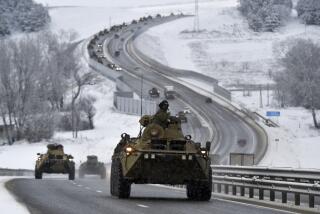Limited Raids Make Sense
- Share via
While Russia, France and various Arab states continue to strongly oppose any U.S. use of military force against Iraq, Republican leaders are increasing pressure on President Clinton to adopt a bolder action plan aimed at driving Saddam Hussein from power and ending Iraq’s threat to its neighbors. On occasion, GOP spokesmen have even seemed to hint at support for an invasion of Iraq to complete what the 100-hour Gulf War left unfinished seven years ago, an end to Hussein’s tyranny and the threat to regional security that his megalomania presents.
The Clinton administration seems to have settled on considerably less ambitious but more readily achievable objectives. The bombs and missiles it is prepared to use against Iraq are intended to set back Hussein’s programs for developing terror weapons and weaken the military props of his regime. The goal is to reduce the immediate threat posed by Iraq’s clandestine efforts to build up an arsenal of chemical and biological weapons and to exact a heavy material price for its defiance of U.N. mandates. Clinton, in short, is ready to use limited means for a limited purpose. Given the political realities, so different from those produced by Iraq’s invasion of Kuwait in 1990, this is a reasonable goal.
As a policy it is not without dangers, perhaps the biggest being that after the last shot has been fired Hussein might appear to the credulous to be all the more formidable for having again withstood U.S. power. But the risks of doing nothing, of adapting to the status quo, of allowing Iraq to drag out its evasions of U.N. resolutions, are infinitely more risky. For the central issue here is not something that can be responsibly resolved by the give and take of diplomacy. Saddam Hussein continues to defy U.N. demands that he give up all of his terror weapons, and so he remains an international menace. That is the bedrock issue that cannot be compromised or finessed.
Clinton’s approach deserves bipartisan backing, and certainly it merits far more support than it has received from fair-weather friends abroad. Only the British are actively preparing to take part, though Canada and Germany have offered “support.”
It is not a plan based on inflated expectations. Hussein, along with a lot of his chemical and biological weapon programs, probably would survive the assaults being readied. But many of his weapon sites would be destroyed, and the foundations of his rule and support could be further eroded. That may be less than ideal, but most things in this world are.
More to Read
Sign up for Essential California
The most important California stories and recommendations in your inbox every morning.
You may occasionally receive promotional content from the Los Angeles Times.












